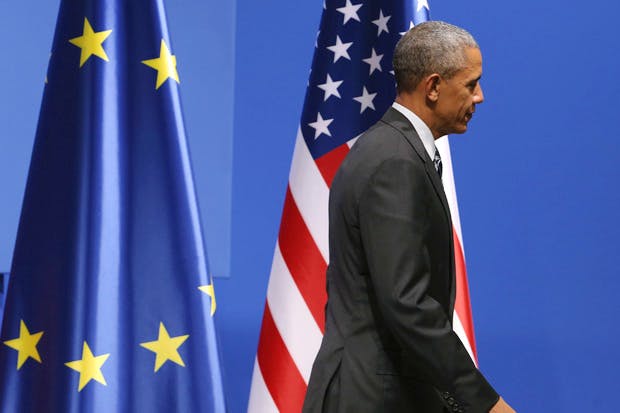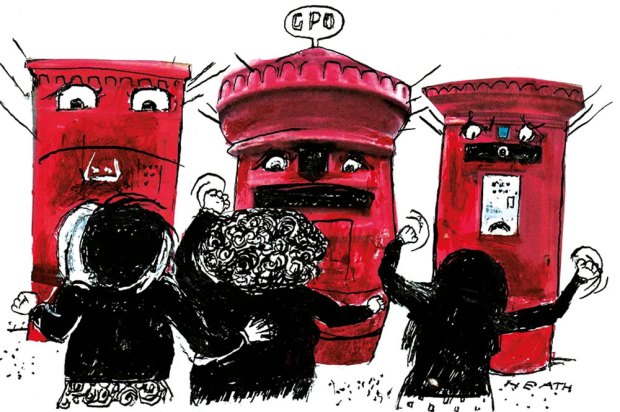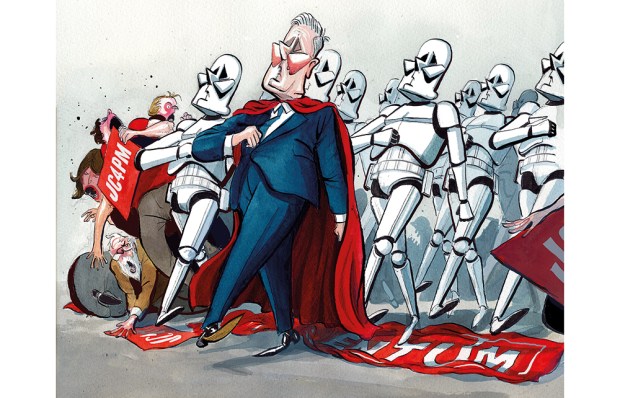Should we care two hoots whether negotiation of the Transatlantic Trade and Investment Partnership (TTIP, pronounced ‘Tee-tip’ by cognoscenti) has ‘de facto failed’? That’s what German economy minister Sigmar Gabriel said this weekend, pointing out that since talks between Brussels and Washington began three years ago, no agreement had been reached under any of the 27 headings tabled. European Commission spokesmen rushed to claim the deal was still alive, but no one would bet on it reaching a conclusion in this decade — nor on that conclusion, whatever its shape, being greeted with joy by Europe’s citizens.
‘So what?’ I hear you ask. We’re not going to be part of it anyway, and if the Europeans aren’t smart enough to agree terms for ‘the world’s biggest free-trade area’, with all the extra jobs and growth that promises, then surely the door is open for top trade negotiator Liam Fox to shimmy in and secure Britain’s place as America’s best buddy on this side of the pond?
Except, of course, that it isn’t like that. Barack Obama has already told us we’re at the back of the queue. An ultra-protectionist President Trump won’t do trade deals anywhere, while President Hillary won’t sign anything that’s an obvious threat to American jobs. But let’s assume she wants TTIP to happen (alongside the similar Transpacific Partnership) to boost her image as a global stateswoman. If so, it will have to look like a win for America, and it will become the template for any subsequent US-UK deal — because Brussels will go ballistic if we seek more favourable terms, and Washington will have no reason to offer them.
Meanwhile, TTIP talks so far illustrate what we would be up against. Far from embracing partnership, American negotiators play hardball from start to finish, and also insist on secrecy. TTIP’s critics say the only outsiders able to influence progress are big corporate lobbyists — unlike MEPs, who are allowed sight of key documents only under absurdly restricted conditions. TTIP’s critics are, of course, mostly on the left, in the European parliament and our own trade union movement. They want TTIP to fail because they don’t want big-corporate capitalism to succeed in what they see as an anti-democratic stitch-up, particularly in relation to proposed ‘investor-state dispute settlement’ rules which would let companies sue governments for loss of profit as a result of changes in the law. So they fill the air with scare stories about the NHS being under threat from US predators, and about genetically modified US food products and toxic cosmetics that would win access to European supermarket shelves.
TTIP’s advocates say protections can be built in on all fronts and the economic boost (David Cameron once claimed TTIP would bring ‘two million extra jobs’, though he didn’t say where) will justify the hassle. But the process is so opaque that no one can be confident of the outcome, and the adversarial tone speaks more of zero-sum than win-win. If TTIP really does grind to a halt, it will offer a reality check for pundits and politicians who talk of glorious trade deals ahead for post-Brexit Britain. Of course we should be selling our goods and services to the world as hard as we can — but if we think we’ll do better by trying to secure special status as other nations’ best buddies, disappointment looms.
Apple’s morality tale
It’s not easy to unravel the morality of the tale of Apple and its €13 billion Irish tax demand. Ireland has been very shrewd in offering ultra low tax deals to attract inward investment from US multinationals, and that has long been an irritation to Brussels. Apple employs 5,500 people in Ireland — and a team of tax lawyers around the world who are even smarter than its iPhone designers. It has used the Irish domicile of key parts of its business to minimise tax paid on profits in the US, to the annoyance of a Senate subcommittee. But that still means ‘Apple pays every tax dollar we owe’, according to chief executive Tim Cook, who dismissed suggestions to the contrary as ‘total political crap’.
Now EU competition commissioner Margrethe Vestager has ordered the Irish government to claw €13 billion in back taxes from Apple — the difference between Ireland’s standard 12.5 per cent corporation tax rate and the minuscule levies actually paid by Apple over many years, which she says represent unfair and illegal ‘state aid’. But Dublin doesn’t want to receive this tax windfall because it would set a precedent of interference in Irish jurisdiction, so will join Apple in appealing against the Brussels ruling. Meanwhile, Washington is furious with Brussels for acting as a ‘supranational tax authority’ in its pursuit of Apple and other US multinationals, including Amazon, Starbucks and McDonald’s — though Washington’s Department of Justice is notorious for its own extraterritorial pursuit of US tax evaders in Europe and elsewhere.
Confused? Me too. Who wins? The lawyers. Who loses? The ordinary citizen everywhere, paying more tax and receiving worse public services because competing governments create tax muddles for clever corporations and their lawyers to exploit. And will Apple’s case improve the likelihood of TTIP being signed any time soon? I fear that one hardly needs an answer.
Home at last
At least I can report a minor advance in Anglo-French co-operation, after a trouble–free drive home from the Dordogne. The Eurotunnel terminus at Coquelles now offers a drive-through ‘pet check-in’ lane manned by a charming French girl who, thanks to number-plate recognition, greeted me by name before I proffered the dog’s passport. At the human passport barrier, on the other hand, there were heavier than usual checks on the UK side — but only after passing French booths containing no officers on duty at all. So if you’re a would-be jihadist whose details happen to be in French border-control computers but not ours: welcome to Britain.
Got something to add? Join the discussion and comment below.
Get 10 issues for just $10
Subscribe to The Spectator Australia today for the next 10 magazine issues, plus full online access, for just $10.















Comments
Don't miss out
Join the conversation with other Spectator Australia readers. Subscribe to leave a comment.
SUBSCRIBEAlready a subscriber? Log in